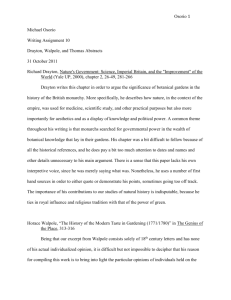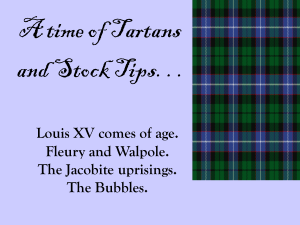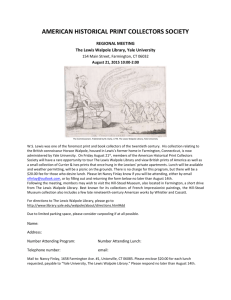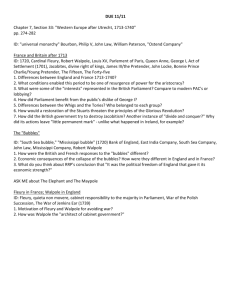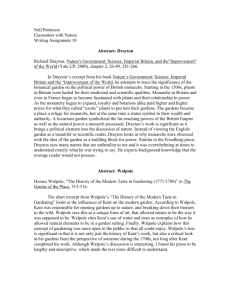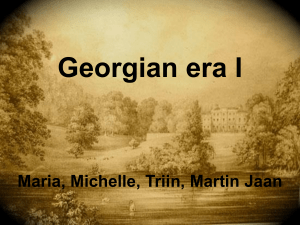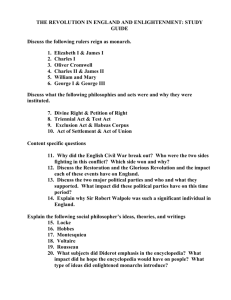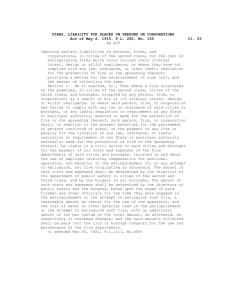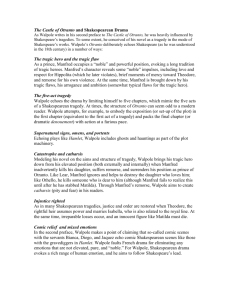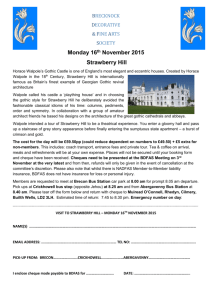The Revolutionary Settlement of 1689
advertisement
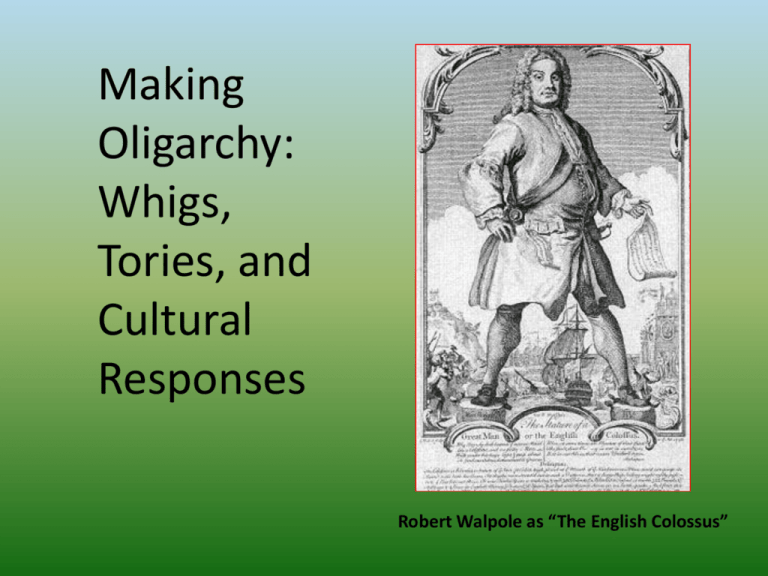
Making Oligarchy: Whigs, Tories, and Cultural Responses Robert Walpole as “The English Colossus” 18C Parliament: some numbers • House of Commons • England: 489 members – 80 from the 40 counties – 4 from Oxford & Cambridge – 405 from boroughs • Wales: 24 members; Scotland: 45 The House of Lords • Usually c.220 total • 26 Anglican bishops also sit • Could reject bills passed by Commons – Except money bills (finance and taxation) Newcastle was an exemplar of the “pocket borough” system, alleged to have at least seven boroughs under his control. Structure of 18C Parliament • Who do peers represent? • Commons MPs? – County MPs: 40-shilling freehold qualification – Boroughs = uneven levels of representation – “rotten” and “pocket” boroughs – Parties or “factions”? The ruins of All Saints Church, Dunwich, in a 1904 postcard. The East Anglia cliffs crumble away… Special tensions, 1689-1715 • Disputed succession (1715 & 1745!) • The “rage of party” – Whigs: “country” interest – Tories: crown and church – Popular participation in a time of war Daniel Burgess's Presbyterian meetinghouse in Carey Street, London, is wrecked by the mob during the antiDissenter Sacheverell riots of 1710 The Whig Junto • William and the Whigs, 1694 – Triennial Act – Patronage as a system – War and the Bank of England, 1694 – A shift in court/country allegiances The Bank of England, as it appeared while occupying Grocer’s Hall, London. from 1694-1732. The Hanoverian Succession • Queen Anne, last of the Stuarts, d1714 • The Electors of Hanover (George!) • Tory weaknesses – – – – Bolingbroke and “treason” The ‘15 invasion Death of Louis XIV Scottish support? • Septennial Act (1715) • “Whig Oligarchy”: 1715-1760 Ruthven Barracks, set on an old castle mound near Ruthven, Highland in Scotland, are the smallest but best preserved of the four English barracks built in 1719 after the 1715 Jacobite rising. Inventing the Prime Minister • Robert Walpole (1676-1745) • Walpole and the South Sea Bubble, 1720 • Parliamentary “placemen” • The Augustan Age in literature – Tory satirists – The Beggar’s Opera, by John Gay (1728) – Licensing Act, 1737 Excise in Triumph (1733) The election agitation of 1733-34 was dominated by images such as this one, of Walpole and the military, with an army of taxmen, riding roughshod over the nation's rights. Beneath the wheels of the minister's excise carriage lies Magna Charta (Magna Farta, in the print, to show how little Walpole cared for it), and the carriage is pulled by a despondent British lion, wearing the clogs that were the symbol of a French-style slavery under an absolute monarch. Cultural responses to Oligarchy • The Augustan Age in literature – Tory satirists – The Beggar’s Opera, by John Gay (1728) – Licensing Act, 1737 John Gay (1685-1732) For Thursday • How did religion influenced the Enlightenment in Britain? How did the Enlightenment influenced religion? • What role did Dissenters play in the Enlightenment? • How did “popular religion” differ from the standard religions? • Explain the rise of Methodism.
